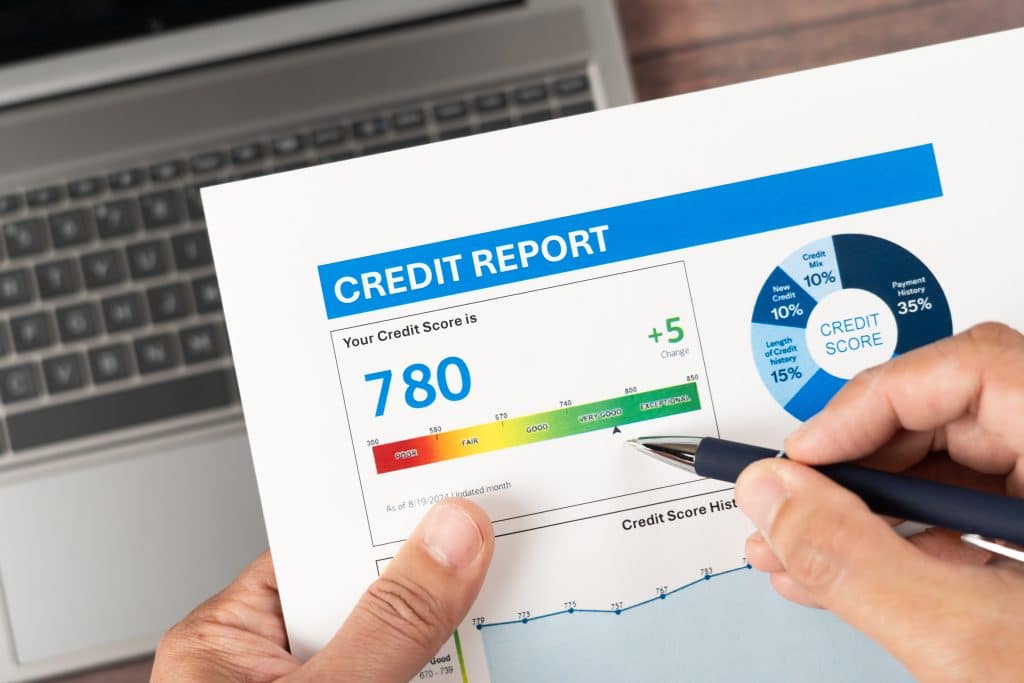Credit score changes 2025: what you need to know

Anúncios
Credit score changes are one of the most talked-about financial topics in 2025 — and for good reason.
As lenders begin adopting new scoring models and incorporating alternative data like rent, utility, and subscription payments, the way your creditworthiness is assessed is evolving rapidly.
These shifts could significantly impact your ability to qualify for loans, secure favorable interest rates, or even get approved for a credit card.
So if you’re wondering how these credit score changes might affect your financial future — and what you can do to prepare — you’re in the right place. Let’s explore everything you need to know.
Anúncios
Understanding credit scores: an overview

Grasping how credit scores function is fundamental for navigating today’s financial world. With credit score changes on the rise, knowing how your score is built — and what can influence it — is more important than ever.
Whether you’re applying for a mortgage, leasing an apartment, or even job hunting, your credit score can open or close doors.
Anúncios
What is a Credit Score?
A credit score is a numerical representation — typically ranging from 300 to 850 — that reflects your creditworthiness.
Lenders, landlords, insurers, and even some employers use this score to assess how likely you are to repay debt responsibly.
The higher your score, the lower the risk you pose to lenders. That’s why keeping your score in a healthy range can unlock better interest rates, credit limits, and approval odds.
With upcoming credit score changes, traditional scoring models are starting to consider alternative data like rent and utility payments, meaning more people may soon gain access to credit.
How Credit Scores Are Calculated
Credit scoring models, like FICO and VantageScore, analyze your financial behavior using five main factors. These percentages represent how much weight each element carries in your total score:
✅ 1. Payment History (35%)
This is the most important factor. It reflects whether you’ve paid past credit accounts on time. Late or missed payments negatively impact your score, while consistent on-time payments help build trust.
💳 2. Credit Utilization Ratio (30%)
This is the percentage of your available credit you’re using. A high utilization ratio (above 30%) may suggest financial strain, while a low ratio indicates responsible usage. Keeping this below 10% is ideal for maximizing your score.
📆 3. Length of Credit History (15%)
The longer your credit history, the more data lenders have to assess. Keeping older accounts open (even if unused) can improve this metric.
This is especially helpful when adapting to future credit score changes that may rely less on traditional scoring but still consider history.
🔄 4. Types of Credit Used (10%)
Also known as “credit mix,” this factor evaluates the variety of accounts you manage — such as credit cards, car loans, student loans, and mortgages. A diverse credit profile shows you can handle different types of credit responsibly.
🆕 5. Recent Credit Inquiries (10%)
Each time you apply for credit, a hard inquiry is made. Too many inquiries in a short time can lower your score temporarily. Space out your applications and only apply when necessary.
Factors Affecting Your Credit Score
Several factors contribute to your credit score, including:
- Payment history: It accounts for about 35% of your score, showing whether you pay your bills on time.
- Credit utilization: This is the amount of credit you’re using compared to your credit limits, affecting around 30% of your score.
- Length of credit history: A longer credit history can positively influence your score.
Understanding these factors can help you make informed financial decisions. If you are aware of what influences your score, you can improve it effectively. Monitoring your score regularly enables you to take action if necessary.
Why is Credit Score Important?
In today’s financial climate — especially with rapid credit score changes taking place — your credit score has a direct impact on your ability to:
- Get approved for loans, credit cards, and leases
- Secure lower interest rates, saving you thousands
- Negotiate better terms with creditors and lenders
- Pass background checks for job opportunities or apartment rentals
A strong score signals that you’re a low-risk borrower, while a weak score can limit your financial options and result in higher costs.
Predicted Credit Score Changes: What to Expect From New Scoring Models
As we move further into 2025, credit score changes are becoming a major topic in the world of personal finance. Traditional scoring methods are shifting toward more inclusive and realistic models.
Understanding these predicted updates is essential to prepare for how lenders may soon evaluate your creditworthiness.
What Will Be Different in Scoring Criteria?
The new scoring models are designed to go beyond the conventional data found in credit reports.
These credit score changes aim to provide a fuller picture of a consumer’s financial behavior — especially for those who have little or no credit history.
🏦 Bank Account Management
How you handle your everyday banking — like maintaining a positive balance or avoiding overdraft fees — may now influence your credit score. This gives lenders more insight into your real financial habits, even outside of credit use.
🏠 Utility and Rent Payments
On-time payments for rent, electricity, water, and internet may be included in your score. These recurring expenses, often ignored in traditional models, are now being used to show your ability to meet regular obligations.
🌐 Alternative and Subscription Data
Payment history on services like phone bills, streaming platforms, and even gym memberships could play a role. These alternative data sources reflect your reliability — even if you don’t use credit cards or loans.
- According to CNBC, scoring models such as FICO 10T and VantageScore 4.0 are already incorporating this kind of data to help more people qualify for credit.
How Credit Score Changes Will Affect Consumers
The upcoming credit score changes are expected to bring more fairness and accessibility to the credit system. These updates could help millions of people build or improve their credit profiles.
🔓 Greater Access to Credit
People previously considered “credit invisible” — like young adults, immigrants, and cash-based households — may finally gain access to loans, credit cards, and other financial products.
💸 Better Loan Terms
If your credit score improves under the new models, you could qualify for lower interest rates and higher borrowing limits. These benefits can lead to significant long-term savings.
📉 Less Emphasis on Traditional Credit
With alternative data gaining importance, the pressure to rely solely on credit cards or loans to build a score is reduced. This is good news for consumers who demonstrate reliability through consistent day-to-day payments.
How to Improve Your Credit Score by 2025 and Adapt to Credit Score Changes

With major credit score changes taking shape in 2025, taking control of your score has never been more important.
Whether you’re planning to buy a home, get a new car, or qualify for a credit card with great perks, improving your score can unlock better financial opportunities.
But boosting your credit isn’t about shortcuts — it’s about smart, consistent habits that align with how scoring models are evolving.
Essential Steps to Improve Your Credit Score
There are proven actions you can start taking today to gradually raise your credit score and prepare for the latest credit score changes.
📅 1. Pay All Bills On Time, Every Time
Your payment history is the most heavily weighted factor in your score — missing even one due date can have a major impact. Set up automatic payments or use reminders to stay current on credit cards, loans, utilities, and rent.
💳 2. Lower Your Credit Utilization Ratio
Your credit utilization ratio measures how much of your available credit you’re using. Aim to keep this ratio below 30%, and ideally under 10% for maximum impact. This shows lenders that you manage your credit responsibly and don’t rely too heavily on borrowed money.
🧾 3. Review Your Credit Reports Regularly
Errors on your credit report — such as incorrect balances, duplicated accounts, or outdated personal info — can harm your score.
Visit AnnualCreditReport.com to access your free reports and dispute any inaccuracies with the credit bureaus.
Utilizing Credit Monitoring Tools
Consider using credit monitoring services to keep track of your score. These tools can help you get alerts for changes in your credit profile. Being proactive can allow you to address issues before they become bigger problems.
You might also want to consider becoming an authorized user on someone else’s card with a good payment history. This can help improve your score by adding positive credit history to your report.
Financial Education and Awareness
Educating yourself about credit can also aid your efforts. Understand how different actions affect your score. Knowledge is power when it comes to managing your credit successfully.
As you work on improving your score, remember to be patient. Building credit takes time and continual effort. Focus on responsible financial habits now to secure a better financial future.
The impact of credit score changes on loans
The impact of credit score changes on loans can be significant. As your credit score fluctuates, it can directly affect the terms you receive from lenders.
A higher credit score usually leads to better loan offers and lower interest rates, while a lower score may result in higher costs.
Loan Interest Rates
One of the most direct impacts of a credit score change is on interest rates. When your credit score improves, lenders often offer you lower interest rates.
For instance, a score above 700 generally qualifies borrowers for more favorable rates. On the other hand, a score below 600 might see interest rates rise.
Loan Approval Chances
The likelihood of getting approved for a loan is also heavily influenced by your credit score. As your score improves, lenders are more likely to see you as a reliable borrower.
This can lead to a greater number of approved applications. Lower scores, however, can increase the chances of denial, making it critical to maintain or improve your credit score.
Types of Loans Affected
Many types of loans are influenced by credit scores, including:
- Mortgages: A strong credit score can help you secure a better rate and lower payments.
- Auto loans: Higher scores typically lead to lower financing charges.
- Personal loans: Your credit score can determine both the loan amount and the interest rate.
As financing is often tied to scores, knowing how changes affect your credit can guide your financial decisions. By improving your score, you can unlock lower rates and better loan terms.
What consumers should do to prepare
What consumers should do to prepare for upcoming credit score changes is essential in today’s evolving financial landscape. Taking proactive steps can make a significant difference in how you manage your credit moving forward.
Review Your Credit Report
The first action is to obtain and review your credit report. Monitoring your report allows you to spot any inaccuracies or fraudulent activity. Make sure to check all accounts for errors, as mistakes can negatively impact your score.
Improve Your Payment Habits
Establishing good payment habits is another crucial step. Paying all your bills on time can have a positive effect on your credit score. Consider setting up automatic payments or reminders to ensure you stay on track.
Limit New Credit Applications
Applying for too much new credit in a short period can raise red flags for lenders. Keep applications minimal to prevent unnecessary hard inquiries on your credit report.
Focus on maintaining your current accounts instead of constantly seeking new credit.
Educate Yourself on Credit Scoring
Understanding how credit scores work will empower you as a consumer. Research the factors that influence your score and stay updated on upcoming changes. This knowledge helps you make informed financial choices.
- Know your credit utilization: Keep it below 30%.
- Build a solid credit history: Keep older accounts open.
- Consider talking to a credit counselor: They can offer personalized advice.
By taking these steps now, consumers can set themselves up for success in the coming years. Being prepared will help you navigate any changes in credit scoring models and maintain a solid financial standing.
Future trends in credit scoring practices

Future trends in credit scoring practices are expected to change significantly. As technology advances, the way credit is assessed will likely become more sophisticated and inclusive.
Consumers should be aware of these changes to better navigate the financial landscape.
Increased Use of Alternative Data
One major trend is the shift towards using alternative data in scoring models. Traditional credit scores are based mainly on credit history, but future models may incorporate non-traditional factors.
This can include:
- Utility payments: On-time payments for utilities may positively impact scores.
- Rental history: Reporting rental payments can provide a fuller picture of a consumer’s reliability.
- Bank transaction data: How consumers manage their bank accounts could also be considered.
This approach aims to create a more comprehensive understanding of a borrower’s creditworthiness, particularly for those with limited credit histories.
Machine Learning in Credit Decisions
Another trend involves the use of machine learning algorithms. These advanced systems can analyze vast amounts of data more effectively than traditional methods.
They can identify patterns that may indicate a borrower’s likelihood to repay a loan. As lenders adopt these technologies, the reliance on rigid scoring systems might decrease.
Emphasis on Financial Literacy
As credit scoring practices evolve, there will be an increased emphasis on financial literacy. Consumers will need to understand how these changes affect their credit scores.
Programs designed to educate people about managing credit will become more important. This education will empower consumers to take control of their financial futures.
Staying informed about these future trends is essential for anyone interested in maintaining a healthy credit score. By understanding potential changes, you can prepare and adapt your financial habits accordingly.
Get Ahead of Credit Score Changes: Final Thoughts
Staying prepared for upcoming credit score changes is not just a recommendation — it’s a necessity for anyone aiming to maintain financial health in 2025 and beyond.
With lenders adopting new scoring models, including alternative data and behavioral patterns, credit score changes are redefining how trust and responsibility are measured in the credit world.
To thrive in this new era, you must take consistent action. Understanding how credit score changes work is the first step, but the real advantage comes from applying this knowledge to your financial habits.
Here’s how to position yourself for success:
- Review your credit reports frequently to catch and correct errors that could be magnified under new credit score changes.
- Pay all your bills on time, including rent, utilities, and subscriptions, which may now count under modern scoring models influenced by credit score changes.
- Keep your credit utilization low, ideally under 30%, as this remains a critical factor even with ongoing credit score changes.
- Educate yourself continuously about how new scoring models — like FICO 10T and VantageScore 4.0 — reflect current credit score changes and impact your credit profile.
These proactive strategies allow you to not only adapt to credit score changes, but actually benefit from them. Consumers who embrace this shift early will gain better access to loans, lower interest rates, and more favorable terms.
Don’t wait for credit score changes to catch you off guard. Start monitoring your score now, build strong habits, and stay informed about every update.
The sooner you act, the more empowered you’ll be to take advantage of everything these credit score changes have to offer.
🔗 Want to dive deeper into the latest credit score updates?
Check out this complete analysis from CNBC Select on average U.S. credit scores in 2025.
FAQ – Frequently Asked Questions about Credit Score Changes
What are the main factors that affect my credit score?
The main factors include payment history, credit utilization, length of credit history, types of credit used, and recent credit inquiries.
How can I check my credit score for free?
You can check your credit score for free through various online services, credit card companies, or by requesting a free report from the major credit bureaus once a year.
What steps can I take to improve my credit score?
You can improve your credit score by paying bills on time, reducing debt, avoiding new credit applications, and regularly checking your credit report for errors.
How will upcoming changes in credit scoring affect loan approvals?
Upcoming changes may lead to more inclusive lending practices, potentially increasing the approval rates for those with limited credit history or alternative credit data.
Liked the article?





